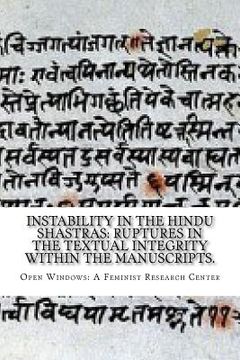Instability in the Hindu shastras: ruptures in the textual integrity within the manuscripts. (en Inglés)
Reseña del libro "Instability in the Hindu shastras: ruptures in the textual integrity within the manuscripts. (en Inglés)"
It would be myopic if we refused to acknowledge that Max Mueller's (German philologist and Orientalist: 1823-1900) contribution to how the Hindu shastras were translated is essential to a nuanced understanding of how exactly were the editorial and textual processes involved in creating these texts. We can choose to disregard those parts of Muller's works that are a result of his personal biases which are symptomatic of Orientalist scholarship of the colonial period of the last two hundred years, but we cannot choose to undermine Mueller's mastery of Sanskrit. In The Complete Works of Swami Vivekananda (Vol. 5) Swami-ji himself compares Max Mueller's efforts as being akin to Sayana's commentaries. We are therefore - coerced to also accept Max Mueller's translations of the Hindu shastras and self-reflexive commentaries on how he collated the different manuscripts of the Hindu shastras that were available to him.From: Lectures on the Origin and Growth of Religion. As Illustrated by the Religions of India. Max Mueller (New York: Charles Scribner's Sons, 1879).At present, no doubt, there are MSS. of the Veda, but few Sanskrit MSS. in India are older than 1000 after Christ, nor is there any evidence that the art of writing was known in India much before the beginning of Buddhism, or the very end of the ancient Vedic literature. How then were these ancient hymns, and the Brahmanas, and it may be, the Sutras too, preserved? Entirely by memory, but by memory kept under the strictest discipline. As far back as we know anything of India, we find that the years which we spend at school and at university, were spent by the sons of the three higher classes, in learning from the mouth of a teacher, their sacred literature. This was a sacred duty, the neglect of which entailed social degradation, and the most minute rules were laid down as to the mnemonic system that had to be followed. Before the invention of writing, there was no other way of preserving literature, whether sacred or profane, and in consequence every precaution was taken against accidents....And my fairy-tale is not all over yet. These men, and I know it as a fact, know the whole Rig-Veda by heart, just as their ancestors did, three or four thousand years ago; and though they have MSS., and though they now have a printed text, they do not learn their sacred lore from them. They learn it, as their ancestors learnt it, thousands of years ago, from the mouth of a teacher, so that the Vedic succession should never be broken. That oral teaching and learning became in the eyes of the Brahmans one of the great sacrifices, and though the number of those who still keep it up is smaller than it used to be, their influence, their position, their sacred authority, are as great as ever. These men do not come to England, they would not cross the sea. But some of their pupils, who have been brought up half on the native, and half on the English system, are less strict. I have had visits from natives who knew large portions of the Veda by heart; I have been in correspondence with others who, when they were twelve or fifteen years old, could repeat the whole of it. They learn a few lines every day, repeat them for hours, so that the whole house resounds with the noise, and they thus strengthen their memory to that degree, that when their apprenticeship is finished, you can open them like a book, and find any passage you like, any word, any accent. One native scholar, Shankar Pandurang, is at the present moment collecting various readings for my edition of the Rig-Veda, not from MSS., but from the oral tradition of Vaidik Srotriyas.

